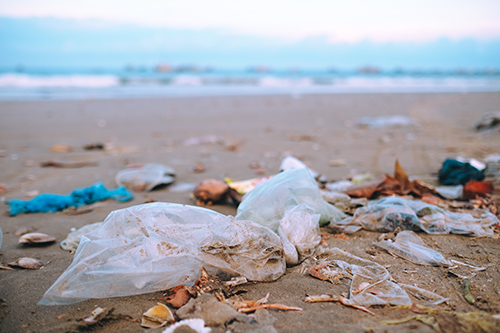Today marks UN World Environment Day, which takes place against a background quite different to any of its predecessors since its inception in 1972.
The global reduction in human activity as a result of COVID-19 lockdowns – industrially and in terms of travel – has had an unexpected impact, giving the environment an unprecedented holiday and, with it, allowing humanity an insight into the impact of pollution on populations the world over.
Both China and India have seen vastly improved air quality – not only is breathing less hazardous, people in those countries can see further too, because there hasn’t been the same smog.
In Italy, from early in the lockdown, the water quality in and around Venice had cleared so much that marine life was visible from above.
The details are worth looking at more closely.
In Wuhan, China, where the virus emerged, the lockdown has seen a 63% reduction in nitrogen dioxide concentrations.
Two new studies, published in the journal of the American Geophysical Union, found that nitrogen dioxide pollution over northern China, Western Europe and the US decreased by as much as 60% in early 2020 when compared to the same time last year.
By the end of April, the Centre for Research on Energy and Clean Air was reporting that the improvement in air quality over the previous month of the coronavirus lockdown had led to 11,000 fewer deaths from pollution in the UK and elsewhere in Europe.
It had calculated that sharp falls in road and industrial emissions meant 1.3m fewer days of work absence, 6,000 fewer children developing asthma, 600 fewer preterm births and 1,900 fewer visits to accident and emergency departments.
In London alone, the City of London Corporation (the City’s ‘council’) said that, in late May, nitrogen dioxide levels in the business area had reduced by around 35% since the beginning of lockdown. Around half of the capital’s air pollution comes from road transport.
If nature can promote a sense of wellbeing, then there is anecdotal evidence that people have appreciated hearing birdsong – particularly in urban environments – where usually there is only the sound of traffic.
As these things have provided a new sense of focus to consider the environment, with a growing number of voices saying that the post-pandemic world must involve a green settlement.

Yet even as people consider the benefits of a healthier environment, mountains of litter left at beauty spots and in parks by people breaking out of the lockdown – costing cash-strapped, struggling councils dear to clear – raise doubts as to whether there will be any real change.
The pandemic has helped emphasise the importance to health and wellbeing of our parks, and with many areas already doing more to encourage cycling to help social distancing, it will be more vital than ever that local government receives the proper funding to enable such moves.
As UNISON general secretary Dave Prentis put it: “We will need to rebuild our public services that have performed so magnificently in this crisis. There cannot be a return to what went before.
“We need to be building back better, so our public services are properly funded and can tackle both climate change and entrenched inequality.”
And he added that, next year, “the eyes of the world will be on the international environment summit in Glasgow. We need to show them that we have learnt the lessons and that strong public services are a pre-condition of protecting people from crises and tackling the big challenges.”
In Scotland, where that summit will take place, UNISON was one of a coalition of 80 groups that, at the end of May, called on First Minister Nicola Sturgeon to create a radical economic recovery from the pandemic that prioritises people and planet over profit.
Stephen Smellie, UNISON’s Scottish deputy convenor and a member of the national executive council, has long experience of working on environmental issues.
He notes that: “People have seen what our cities and towns can be like when we reduce the cars on the road and air traffic.
“Clean air creates a better environment, it smells and tastes nicer and it is better for our health. In rebuilding our public services, we must not go back to the unhealthy and polluted past.”
UNISON has a vital role to play in campaigning for greener politics, working with employers to make workplaces more sustainable, and informing members of global warming issues.
Members work in a wide range of jobs that have direct environmental roles – in parks, energy and water companies, environment agencies, the meat hygiene service, environmental health, school food, buses and transport planning, cleansing, waste recycling and planning, and many more.
The union is working to help build a greener future, whether in the workplace itself or ensuring that pension funds are invested ethically.
So on World Environment Day, let’s recommit ourselves to a world environment that’s not just for one day.





